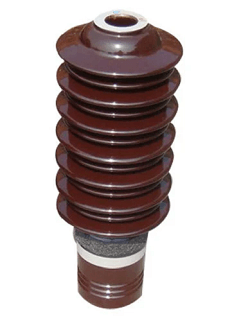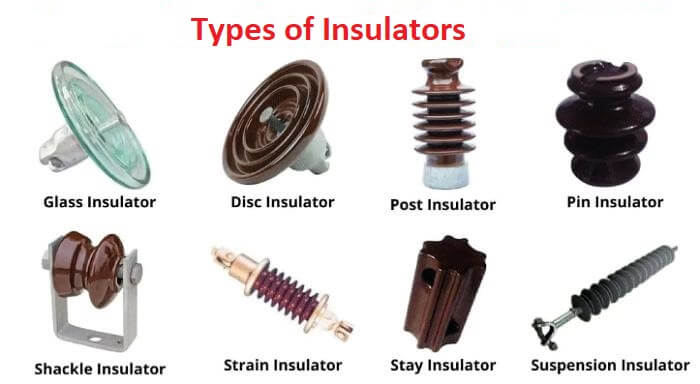Insulator DefinitionAn insulator is a material that does not conduct electricity or heat easily. It is commonly used in electrical and thermal applications to prevent the transfer of energy between two objects. Insulators are crucial for maintaining the safe and efficient operation of electrical and thermal systems. Insulators can also be used for artistic purposes. Glass insulators, which were once used in telephone and telegraph systems, are now popular among collectors and are often used to create unique lighting fixtures and other decorative items. What are Insulators made up of?Insulators are materials that do not conduct electricity or heat easily. They are made up of a variety of materials, each with its own unique properties that make them useful in different applications. 
One of the most common types of insulators is electrical insulators. These are typically made up of materials such as rubber, plastic, glass, or ceramic. Rubber and plastic insulators are often used in low-voltage applications, while glass and ceramic insulators are used in high-voltage applications. These materials have high resistivity to electrical current, which means that they do not allow electricity to flow easily through them. This property makes them useful for preventing electrical currents from escaping and causing damage or injury. Thermal insulators are another type of insulator that is used to prevent heat transfer. These materials are often made up of materials such as fiberglass, foam, or mineral wool. These materials have low thermal conductivity, which means that they do not allow heat to flow easily through them. This property makes them useful for preventing heat transfer and maintaining consistent temperatures. In addition to these common insulating materials, there are also some unique and specialized insulators that are made up of other materials. For example, aerogel is a type of insulator that is made up of a gel-like substance that has been dried to create a solid material. This material has very low thermal conductivity and is often used in high-temperature applications, such as insulation for spacecraft and industrial furnaces. Another example of unique insulating material is vacuum insulation panels (VIPs). VIPs are made up of a vacuum-sealed panel that is surrounded by a layer of insulation material. This design creates an extremely effective insulation system that is often used in high-performance building applications. Types of Insulator
Insulators are materials that do not conduct electricity or heat easily, and they are essential for maintaining the safe and efficient operation of electrical and thermal systems. There are several types of insulators that are commonly used in various applications. In this article, we will discuss the different types of insulators and their applications. Porcelain InsulatorsPorcelain insulators are made up of porcelain, which is a type of ceramic material. They are commonly used in high-voltage electrical applications, such as power transmission lines and transformers. Porcelain insulators are known for their excellent electrical and mechanical properties, and they are able to withstand high temperatures and extreme weather conditions. Glass InsulatorsGlass insulators were once commonly used in telephone and telegraph systems, but they are now primarily used for decorative purposes or as collector's items. These insulators are made up of glass and have a unique design that makes them visually appealing. They are often used to create unique lighting fixtures and other decorative items. Polymer InsulatorsPolymer insulators are made up of high-strength polymer materials, such as silicone rubber or EPDM. They are commonly used in high-voltage electrical applications, such as power transmission lines and substations. Polymer insulators have several advantages over porcelain insulators, including better resistance to vandalism, lighter weight, and greater flexibility. Ceramic InsulatorsCeramic insulators are made up of ceramic materials and are commonly used in high-temperature applications, such as industrial furnaces and kilns. Ceramic insulators are known for their excellent thermal resistance and mechanical strength, and they are able to withstand high temperatures and extreme weather conditions. Rubber InsulatorsRubber insulators are made up of synthetic rubber materials and are commonly used in low-voltage electrical applications, such as household wiring and appliances. Rubber insulators are known for their excellent electrical insulation properties, and they are able to withstand moderate temperatures and weather conditions. Mineral InsulatorsMineral insulators are made up of mineral materials, such as asbestos, and are commonly used in high-temperature applications, such as industrial furnaces and kilns. Mineral insulators are known for their excellent thermal resistance and mechanical strength, and they are able to withstand high temperatures and extreme weather conditions. Applications of InsulatorInsulators are critical components that provide protection against electric shock and prevent the flow of electric current in unwanted areas. Below listed are some of the most common applications of insulators. Electrical WiringInsulators are extensively used in electrical wiring applications. Electrical wires are covered with an insulating layer that prevents electric current from flowing through the wire and reduces the risk of electrical shocks. Insulators used in electrical wiring are made of materials such as rubber, plastic, or fiberglass. These materials are known for their high dielectric strength and low conductivity. Electrical EquipmentInsulators are also used in electrical equipment to prevent electric current from flowing to unwanted areas. Electrical equipment such as transformers, circuit breakers, and capacitors are insulated to protect against electric shocks and to prevent the flow of current to the surrounding environment. Insulating materials used in electrical equipment are often made of ceramics, glass, or plastic. Household AppliancesInsulators are used in many household appliances, including refrigerators, air conditioners, and washing machines. Insulators are used in these appliances to prevent electric current from flowing through the appliance's metal casing and causing electric shocks. Insulators used in household appliances are often made of rubber or plastic. Power LinesInsulators are used extensively in power lines to prevent electric current from flowing through the metal towers and poles that support the power lines. Power lines are often located in areas where the weather can be harsh, so the insulating materials used in power lines must be durable and withstand extreme weather conditions. Insulators used in power lines are often made of glass or ceramics. Automotive IndustryInsulators are used in the automotive industry to protect against electric shocks and to prevent electric current from flowing to unwanted areas. Insulators are used in many components in vehicles, such as spark plugs, alternators, and batteries. Insulators used in the automotive industry are often made of ceramic or rubber. Aerospace IndustryInsulators are used in the aerospace industry to protect against electric shocks and to prevent electric current from flowing to unwanted areas. Insulators are used in many components in aircraft, such as engines, avionics, and navigation systems. Insulators used in the aerospace industry are often made of ceramics or plastics that are lightweight and can withstand extreme temperatures and pressure. Medical EquipmentInsulators are used in medical equipment to protect against electric shocks and to prevent electric current from flowing to unwanted areas. Insulators are used in many medical devices, such as electrocardiogram machines, defibrillators, and pacemakers. Insulators used in medical equipment are often made of plastics or ceramics that are biocompatible and can withstand sterilization. Properties of InsulatorsInsulators have several important properties that make them suitable for their various applications. High Dielectric StrengthOne of the most critical properties of insulators is their high dielectric strength. Dielectric strength is the maximum voltage that a material can withstand without breaking down and allowing electric current to flow. Insulators have high dielectric strength, which means that they can withstand high voltages without allowing electric current to flow through them. Low Electrical ConductivityInsulators have low electrical conductivity, which means that they do not allow an electric current to flow through them easily. This property makes insulators suitable for applications where the flow of electric current must be prevented or controlled, such as in electrical wiring or electronic components. Thermal StabilityInsulators must be thermally stable, which means that they must not change their properties when exposed to high temperatures. Many electrical applications involve high temperatures, and insulators must be able to withstand these temperatures without melting or degrading. Chemical ResistanceInsulators must also be chemically resistant to prevent damage from chemicals or corrosive substances. Insulators used in harsh environments must be able to resist chemical attacks and maintain their insulating properties. Mechanical StrengthInsulators must also have adequate mechanical strength to withstand physical stress and pressure. Insulators used in power lines or machinery must be able to withstand harsh environmental conditions and resist wear and tear. ConclusionIn conclusion, insulators have several important properties that make them suitable for their various applications. These properties include high dielectric strength, low electrical conductivity, thermal stability, chemical resistance, and mechanical strength. The selection of an insulator for a specific application depends on the insulating properties required for that application and the environment in which it will be used.
Next TopicProjects Definition
|
 For Videos Join Our Youtube Channel: Join Now
For Videos Join Our Youtube Channel: Join Now
Feedback
- Send your Feedback to [email protected]
Help Others, Please Share










